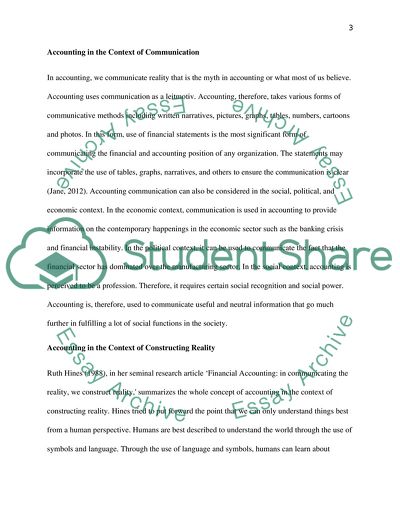Cite this document
(Accounting does not communicate reality, it constructs reality (HINES Essay, n.d.)
Accounting does not communicate reality, it constructs reality (HINES Essay. https://studentshare.org/finance-accounting/1848885-accounting-does-not-communicate-reality-it-constructs-reality-hines-1988-extracted-from-cooper-c-2013-a-critical-perspective-in-jack-l-davison-j-and-craig-r-eds-2013-the-routledge-companion-to-accounting-communication-londo
Accounting does not communicate reality, it constructs reality (HINES Essay. https://studentshare.org/finance-accounting/1848885-accounting-does-not-communicate-reality-it-constructs-reality-hines-1988-extracted-from-cooper-c-2013-a-critical-perspective-in-jack-l-davison-j-and-craig-r-eds-2013-the-routledge-companion-to-accounting-communication-londo
(Accounting Does Not Communicate Reality, It Constructs Reality (HINES Essay)
Accounting Does Not Communicate Reality, It Constructs Reality (HINES Essay. https://studentshare.org/finance-accounting/1848885-accounting-does-not-communicate-reality-it-constructs-reality-hines-1988-extracted-from-cooper-c-2013-a-critical-perspective-in-jack-l-davison-j-and-craig-r-eds-2013-the-routledge-companion-to-accounting-communication-londo.
Accounting Does Not Communicate Reality, It Constructs Reality (HINES Essay. https://studentshare.org/finance-accounting/1848885-accounting-does-not-communicate-reality-it-constructs-reality-hines-1988-extracted-from-cooper-c-2013-a-critical-perspective-in-jack-l-davison-j-and-craig-r-eds-2013-the-routledge-companion-to-accounting-communication-londo.
“Accounting Does Not Communicate Reality, It Constructs Reality (HINES Essay”. https://studentshare.org/finance-accounting/1848885-accounting-does-not-communicate-reality-it-constructs-reality-hines-1988-extracted-from-cooper-c-2013-a-critical-perspective-in-jack-l-davison-j-and-craig-r-eds-2013-the-routledge-companion-to-accounting-communication-londo.


